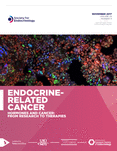Intratumoral androgen biosynthesis in prostate cancer pathogenesis and response to therapy
- Hematology Oncology Division, Department of Medicine, Beth Israel Deaconess Medical Center and Harvard Medical School, 330 Brookline Avenue, Boston, Massachusetts 02215, USA
- (Correspondence should be addressed to S P Balk; Email: sbalk{at}bidmc.harvard.edu)
Abstract
The majority of prostate cancers (PCa) express high levels of androgen receptor (AR) and are dependent for their growth on testosterone produced by the testes, which is reduced in the prostate to the higher affinity ligand 5α-dihydrotestosterone (DHT). PCa growth can be suppressed by androgen deprivation therapy, which involves removal of testicular androgens (surgical or medical castration) or treatment with an AR antagonist (or a combination of both), but patients invariably relapse with tumors that have been termed castration recurrent/resistant PCa (CRPC). Importantly, AR transcriptional activity becomes reactivated at this CRPC stage of the disease and remains essential for tumor growth. The objective of this review is to outline one clinically important mechanism contributing to this AR reactivation, which is increased intratumoral synthesis of testosterone and DHT from weak androgens produced by the adrenal glands and possibly de novo from cholesterol. Early studies showed that a substantial fraction of CRPC patients responded to adrenalectomy or medical suppression of adrenal androgen synthesis using agents such as ketoconazole (CYP17A1 inhibitor), and a recent phase III study of a more potent and selective CYP17A1 inhibitor (abiraterone) has demonstrated an improvement in survival. With the pending FDA approval of abiraterone for CRPC, defining the molecular mechanisms contributing to CYP17A1 inhibitor resistance/relapse and AR reactivation is now critical to build on these advances.
- Revision received 31 May 2011
- Accepted 27 June 2011
- Made available online as an Accepted Preprint 28 June 2011
- © 2011 Society for Endocrinology












